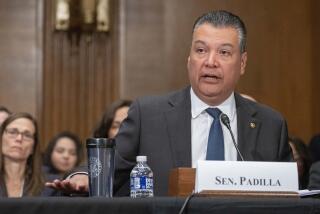Most 1-900 Numbers Don’t Deliver What They Advertise
- Share via
Who wouldn’t be curious? The “Success Line,” 1-900-USA-CASH, promises tips on earning additional income, getting jobs, fixing bad credit. D. J. Jazzy Jeff and the Fresh Prince offer rap sessions on 1-900-909-JEFF. There’s even group conversation, all male, on 1-900-505-JOCK.
Something for everyone. What a kick.
It’s more than that. To the entrepreneurs selling such fare, billed to the caller’s phone, 900 service is the “fourth medium,” after radio, TV and print, says Cory Eisner, vice president of New York-based Phone Programs (Jazzy Jeff and others).
To consumers, it’s a potential nightmare. Such numbers, says a California university professor, fighting the phone company over a child’s unauthorized calls, “in effect turn the telephone into a credit card or blank check, without the protections that federal and state law provide to credit card or check users.”
What’s exciting is the promise of personal access to the information age. There’s talk of financial quotes, legal advice, medical information, of “known and reputable providers who’d like to use (900 service) as an alternative way to service their customers,” says Howard Levin, vice president of marketing at Interactive Telemedia, a Los Angeles “telepromotions” agency.
But that’s mostly talk. There’s more promotion than information broadcast. “It’s sad when you see all the truly fantastic things that can be done with telephones,” says Jeffrey Holtzman, deputy city attorney in Santa Monica, “and what do we get but P. T. Barnum?”
In a week of calling, the most intellectual fare heard was 1-900-WEATHER (75 cents a minute). Typical financial stuff (1-900-USA-CASH, $2 for the first minute, $1 each additional) defined cash reserves as “money you don’t need to live on,” and suggested using credit cards to buy now and pay when one has money.
More than 90% of 900 lines are “entertainment,” and while it’s doubtless someone’s medium, it’s no fourth. It’s inane chatter from a rock star, a rapper, a deservedly starving comic (“Her face brought up more food than a Heimlich maneuver”). More often, it’s clips from albums, books, movies about to be released--undisguised hypes billed to Barnum’s born-every-minute suckers.
Much of the information transmitted comes from the caller, paying to give personal data to sweepstakes promoters, food companies, opinion polls. It’s party-line conversations with consenting men, women, sports fans, or private conversations with other callers (“Hi, this is Lisa, 5’7”, 125 pounds, I’m bi (bisexual) but also straight, Voice mail 31644”).
Alas, one can’t always hear the fourth medium. Telephone wires being rather low fidelity, Jazzy Jeff seemed to bubble up through water, Motley Crue was all beat and static. Six celebrity impersonations for a birthday greeting ($3 to hear them, $11.99 to order one) needed rehearing.
The all-male chat group above (90 cents per minute) was always silent, without participants. Sports Phone Live (99 cents per minute to talk sports with seven to 10 fans and celebrities) had only the staff man, twice. Even 1-900-USA-SWING (67 cents a minute, 15-minute minimum) was all wind whistling through the party lines and occasional voices calling, pathetically, “Hello? Hello? Who’s there? This is Jim. Hello, who’s this? Hello? “
Worse, this fourth medium is being unleashed before the marketplace is ready. The sales arrangements, or lack of them, are almost anti-consumer: There’s little disclosure and no normal retail procedures. The consumer may not know what he’s buying or its price, and can’t cancel the purchase once made.
Nor is it well regulated. The Federal Communications Commission regulates only the terms of the service that telephone carriers provide to interstate “information-providers” (the programming entrepreneurs), not the service those entrepreneurs provide the consumer, or “end user.” The few 900 numbers offering service strictly intrastate come under variable state regulations.
In California, for example, there must be an initial statement of price on such calls, a $20 price cap, a monitor (in the provider’s employ) on party lines to interrupt “harmful matter.” But the rules don’t yet cover all telephone companies, and cover only intrastate calls--a minute portion of the market, indistinguishable to consumers, who have no idea where each 1-900 call goes.
The particular carrier (more than 60 provide 900 service to entrepreneurs) may cancel 900 charges if calls were made without the bill-payer’s knowledge or authorization (by children, perhaps) or if he didn’t know the cost. But most do so only once, and none have provisions for canceling charges if the consumer got bad service or a disappointing product--an empty party line, inane financial advice, inferior porn. “Our basic policy,” says Andrea West, AT&T;’s national marketing manager for 900 service, “is to sustain the charges.”
So much for the retailer. The manufacturers, or providers of these messages are often unknown and never identified and in many cases, says AT&T;’s West, “did not want to be referred to by anyone.” It’s not easy, therefore, to contact the people responsible for a message, even through their carrier (if one can figure out which it is).
AT&T; requires a written inquiry from anyone asking a provider’s identity and provides only name and mailing address. The information line at Telesphere (the USA prefix, among others) is always busy. And Pacific Bell (505-JOCK, among others) took 50 minutes to understand the inquiry and find the right office, right individual and right list providing such information.
Even getting one’s lines blocked from all 900 access isn’t easy. Individual states may make total blocking available or just blocking of intrastate calls, blocking of all 900-code prefixes or blocking of selected prefixes. Some companies don’t even know what they can do: the California professor was told that GTE California doesn’t provide 900 blocking, then that it does but not for all 900 numbers, then that does but not for all his lines (a GTE California spokesman says it does, period).
For telephone companies, for consumers, even for regulators, “it’s very difficult to try to sort out this service, jurisdictionally and otherwise,” says Kathie Kneff, chief of the informal complaints branch of the FCC’s common carrier bureau. Until someone does, consumers would be smart not to use it.
More to Read
Inside the business of entertainment
The Wide Shot brings you news, analysis and insights on everything from streaming wars to production — and what it all means for the future.
You may occasionally receive promotional content from the Los Angeles Times.










